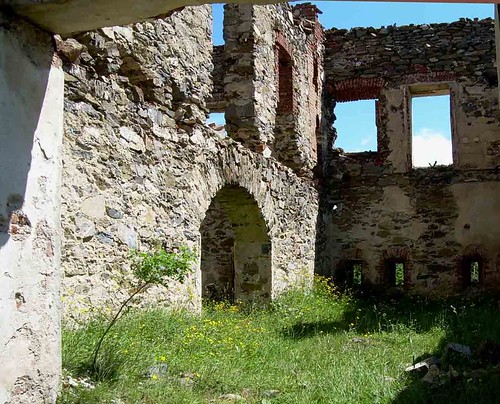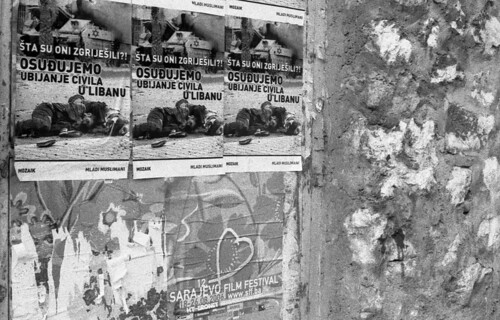Write something meaningful about the war in Libya is difficult. And it's hard to write something meaningful in general on a war like this, now more than ever. You could perhaps do the eve of the first post-Cold War military intervention, Iraq and following. But now, weighed down by these experiences, we can only read and reread the article by Massimo Fini, published newspaper and taken up by the fact MicroMega, and find substantial agreement with him.
We are at war, pace (in fact ...) the UN, President Napolitano and all humanitarian interventions. And we all speed, with a disarming ease (the war also took possession of the lexicon), we slipped in without realizing it. So much so that, on closer inspection, the real results we get are those indicated by Fini: create a precedent unprecedented, indeed, that of an intervention in the private domain of a state that has not invaded any neighbor, but whose central government is rebels in the rebellion of a part of the country that has never digested the unit.
Revive terrorism, happy evolution of the crisis, for legitimizing any other Libyan retaliation. We will protect our interests, making the usual carriers of an ideal of democracy that is so because it suits us, in fact allows us to do our convenient. Intervene for humanitarian purposes, happy not to have been summoned to Egypt - to act against Mubarak was frankly too much for the United States and many foragers of the tyrant - but aware of the impossibility of seeing the dead bodies on the banks to pass - on Beaches - Libya.
If the people stand it on its own, rejoice. Otherwise, we intervene. Requiring, in both cases - you can always, later, complaining of the danger of Islamic extremism - the standard Western democratic rule as the brave new world. The main problem, as always in these cases is that we have to wait to know what we should do.
We should applaud the invasion of Cambodia by the Viet Nam polpottiana, and instead, at the time, we are shocked for the first war between two communist countries. We should stop the massacre in Rwanda, and certainly we would have had to intervene to stop the war in Yugoslavia. But we could (should) act before, not after: we should discuss publicly, such as Europe, rather than just look bewildered, for the immediate recognition by Germany and the European countries, the national claims of Slovenia and companions.
Have we understood that the adoption of a pure strategy as economic self-interest produces unwanted consequences, not just the happy Smithian invisible hand but also the strengthening of the nationalist Milosevic. But now and here (in Libya), what to do? Protest, first, for the shameless subservience to the interests of international political economy: if these interests do not exist, the problem of human rights does not arise.
Convenient pretext for outraged, as human rights (which, unfortunately, even when it is used in good faith is an excuse in international realpolitik), used to bomb a country - excuse me, to maintain a "no-fly zone" - and not simply to block, and the limit even depose a tyrant. Ashamed for the obscene spectacle of international diplomacy - the terrifying Sarkozy el'arrivista Cameron NATO invoked by those who belong to, but not the controls, because those who commanded the fears of the effects that cause the banner, and our, disgraceful, coupled between a ski instructor and singer cruise the formation of the unholy alliance anti-BRIC (Brazil, Russia, China, India) and, as recalled by Paolo Ferrero, even the inclusion of a true champion of democracy, Qatar, in group of crusaders.
To be honest: is not it time to stop using the UN as a pretext? What legitimacy can now derive the UN today in an agreement approved in 1945, which explicitly assigns to the victorious powers of World War II with the task of maintaining peace, and as such has never worked (peace was assured by the scheme of terror run by the two superpowers cold, and when this was not, the United Nations to authorize war ended they could not rely on the consent of the defeat, the post-Soviet Russia).
The Security Council is a non-democratic body and, more simply, old. Enlightened Europe should be concerned primarily to re-examine the bodies for international cooperation with the BRIC countries. So yes, we can legitimately ask what to do with Libya and his regime. Do not have a world war and its winners behind can be a weakness but a strength, if harnessed to create an institution that is truly supranational, which can look (a little 'more) to the general.
In any case, the issue is urgent. The older technologies, such as Fukushima teaches. Our whole world is too old: the IMF is old, it's old Europe, the UN is old. And, the next crisis, the BRIC will not stand to watch. 


We are at war, pace (in fact ...) the UN, President Napolitano and all humanitarian interventions. And we all speed, with a disarming ease (the war also took possession of the lexicon), we slipped in without realizing it. So much so that, on closer inspection, the real results we get are those indicated by Fini: create a precedent unprecedented, indeed, that of an intervention in the private domain of a state that has not invaded any neighbor, but whose central government is rebels in the rebellion of a part of the country that has never digested the unit.
Revive terrorism, happy evolution of the crisis, for legitimizing any other Libyan retaliation. We will protect our interests, making the usual carriers of an ideal of democracy that is so because it suits us, in fact allows us to do our convenient. Intervene for humanitarian purposes, happy not to have been summoned to Egypt - to act against Mubarak was frankly too much for the United States and many foragers of the tyrant - but aware of the impossibility of seeing the dead bodies on the banks to pass - on Beaches - Libya.
If the people stand it on its own, rejoice. Otherwise, we intervene. Requiring, in both cases - you can always, later, complaining of the danger of Islamic extremism - the standard Western democratic rule as the brave new world. The main problem, as always in these cases is that we have to wait to know what we should do.
We should applaud the invasion of Cambodia by the Viet Nam polpottiana, and instead, at the time, we are shocked for the first war between two communist countries. We should stop the massacre in Rwanda, and certainly we would have had to intervene to stop the war in Yugoslavia. But we could (should) act before, not after: we should discuss publicly, such as Europe, rather than just look bewildered, for the immediate recognition by Germany and the European countries, the national claims of Slovenia and companions.
Have we understood that the adoption of a pure strategy as economic self-interest produces unwanted consequences, not just the happy Smithian invisible hand but also the strengthening of the nationalist Milosevic. But now and here (in Libya), what to do? Protest, first, for the shameless subservience to the interests of international political economy: if these interests do not exist, the problem of human rights does not arise.
Convenient pretext for outraged, as human rights (which, unfortunately, even when it is used in good faith is an excuse in international realpolitik), used to bomb a country - excuse me, to maintain a "no-fly zone" - and not simply to block, and the limit even depose a tyrant. Ashamed for the obscene spectacle of international diplomacy - the terrifying Sarkozy el'arrivista Cameron NATO invoked by those who belong to, but not the controls, because those who commanded the fears of the effects that cause the banner, and our, disgraceful, coupled between a ski instructor and singer cruise the formation of the unholy alliance anti-BRIC (Brazil, Russia, China, India) and, as recalled by Paolo Ferrero, even the inclusion of a true champion of democracy, Qatar, in group of crusaders.
To be honest: is not it time to stop using the UN as a pretext? What legitimacy can now derive the UN today in an agreement approved in 1945, which explicitly assigns to the victorious powers of World War II with the task of maintaining peace, and as such has never worked (peace was assured by the scheme of terror run by the two superpowers cold, and when this was not, the United Nations to authorize war ended they could not rely on the consent of the defeat, the post-Soviet Russia).
The Security Council is a non-democratic body and, more simply, old. Enlightened Europe should be concerned primarily to re-examine the bodies for international cooperation with the BRIC countries. So yes, we can legitimately ask what to do with Libya and his regime. Do not have a world war and its winners behind can be a weakness but a strength, if harnessed to create an institution that is truly supranational, which can look (a little 'more) to the general.
In any case, the issue is urgent. The older technologies, such as Fukushima teaches. Our whole world is too old: the IMF is old, it's old Europe, the UN is old. And, the next crisis, the BRIC will not stand to watch.



No comments:
Post a Comment